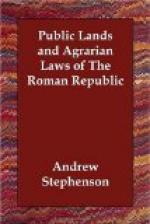The Latini appealed to Scipio in person, and by his influence a bill was passed by the people which withdrew from the commission its jurisdiction and remitted to the consuls the decision as to what were private and what domain lands. This was a mild way of killing the law, and resulted in that. It had, however, in great measure, fulfilled its object and left little territory in the hands of the Roman state.
[Footnote 1: App., I,9; Livy, Epit., LVIII, XII: “possessores, qui filios in potestate haberent, supra legitimum modum ducena quinquagena jugera in singulos retinerent.”]
[Footnote 2: Mommsen states that this privilege was limited to 1000 jugera in all, and Wordsworth follows him, making the same statement. Lange, Roem. Alterthuemer, III, 9, agrees with Mommsen and cites, App. B.C., I, 9, 11; Vell., 2, 6; Livy, Ep., 58; Aurelius Victor, 64; Sic. Flacc., p. 136, Lach. I find no direct proof in the places mentioned of what Lange asserts while App. (I, 11), says: [Greek: “kai paisi, ois eisi paides ekasto kai touton ta aemisea."]. Long says there is no proof of any limitation as to number of sons, while Ihne, Duruy and Nitzsch are agreed in following the statement of Appian, as I have here done. See Marquardt u. Momm., Roem. Alter, 106.]
[Footnote 3: App., I, 11.]
[Footnote 4: Momm., III, 114; Plutarch, Tiberius Gracchus, 9, 1. 9.]
[Footnote 5: App., I, 1. 3.]
[Footnote 6: [Greek: App., I, 9: “Tiberios Grakchos...daemarchon esemnologaese peri tou Italikou genous hos eupolemotatou te kai sungenus phtheiromenou de kat oligon es aporian kai oligandrian]. Also App. B.C., I, 13; [Greek: Grakchas de megalauchoumenos epi to nomo ... oia dae ktistaes ou mias poleos oud henos genous alla panton osa en Italia ethnae es taen oikian parepempeto."]. Ihne, IV, 385. Lange says (III, 10): “Das Gracchus die Latiner und Bundesgenosen nicht beruecksichtigte, war bei der Gesinnung der roemischen Buergerschaft gegen die Latiner ganz natuerlich.” I can not see how he harmonizes this statement with that of App., [Greek: Italikou genous] and [Greek: Italia ethnae]. Momm., Roem. Ge., II, 88.]
[Footnote 7: Sallust, Jugertha, XLII.]
[Footnote 8: App., I, XII; Plutarch, Tiberius Gracchus, X-XII; Julii Flori Epitoma, II, (Biblioth. Teubner, p. 67): “Sit ubi intercedentem legibus suis C. Octavium vidit Gracchus, contra fas collegii, juris, potestas, is injecta manu depulit rostris, adeoque praesenti metu mortis exterruit, ut abdicare se magistratu cogeretur.”]
[Footnote 9: Momm., III, 115.]
[Footnote 10: App., I, 9; Livy, Epit., LVIII, 12; Plut., Tib. Gr., 8-14; Cic., De Leg. Agr., II, 12, 13; Velleius, 2, 2; Aurelius Vic., De Vir. Illus., 64.]
[Footnote 11: Plutarch, Tiberius Gracchus, 13.]
[Footnote 12: Momm., III, 115. See Ihne’s just condemnation of this clause; IV, 387.]
[Footnote 13: Plutarch, Tib. Grac., XIII, ln. 12; Duruy, Hist. Rom., vol. II, pp. 339-420 of Translation.]




